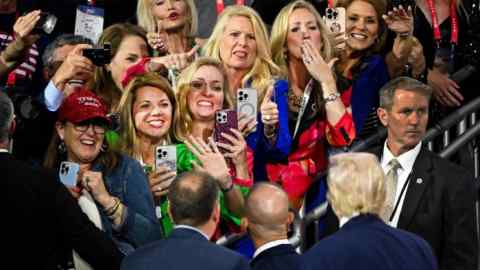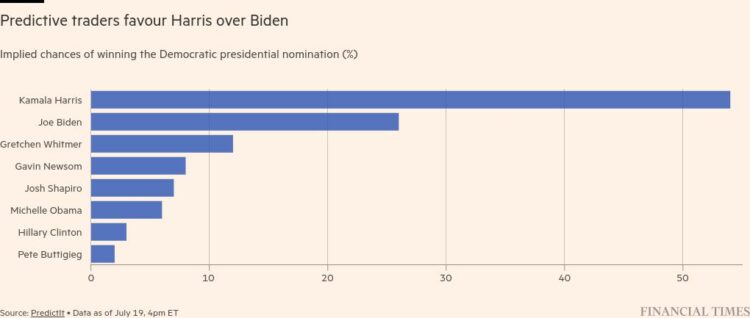Joe Biden says he will remain in the White House race against Donald Trump, even as Democratic mega donors, grandees and a growing list of lawmakers heap new pressure on him to step aside in the face of declining poll numbers and concern over his age and mental acuity.
One big Democratic donor on the West Coast has said that if the president dropped out, the process to replace him “could be the single greatest thing that happens to keep Trump out of the White House”, gripping national attention and giving Democrats a chance to reshape the contest.
But how would it work — and who would replace Biden?
Can Biden make Kamala Harris the candidate?
Not quite. He can endorse his vice-president, and she benefits from a high profile and the money already raised for their joint campaign. But the delegates to the Democratic National Convention in mid-August hold the final power and there is no rule that they must endorse a running mate, only that they should “in good conscience reflect the sentiments of those who elected them”.
Nearly all 4,000 delegates committed to Biden in the party primaries, but he could “release” them, endorse Harris and then seek to accelerate a nominating process. After the first ballot at the convention, delegates are no longer “bound” and can vote for any candidate.
Chris Dempsey, founder of Delegates are Democracy, a grassroots organisation working with delegates, said: “If the president withdraws, from a rules perspective it is wide open and delegates can vote for whoever they want. From a political perspective, if he were to endorse his VP, the delegates may follow but nobody is required to do so.”
Could the party hold a new contest?
This would mark a striking new and uncertain development in a campaign that a few weeks ago seemed dull and predictable. Democratic Representative Jim Clyburn has hinted at support for “mini primaries” and the veteran political consultant James Carville argued recently in The New York Times for a series of town halls moderated by former Democratic presidents.
“Think the Super Bowl with Taylor Swift in the stands. The young, the old and everyone in between will tune in to see history being made in real time,” he wrote.
The Leadership Now Project, a membership organisation of business leaders and academics, says the DNC rules committee or its full membership would have to vote to set up procedures and changes to rules on timelines and debates, but no formal selection would happen ahead of the convention.
A petition signed by 300 delegates, with no more than 50 from any one state, is needed to secure a candidacy. Each candidate must also form a presidential campaign committee and file with the Federal Election Commission to raise funds.
While a super Pac fundraising group could help raise money for a campaign, some expenses — such as staff and the costs of travelling to debates — must be covered by the candidate’s campaign committee directly.
Could there be an ‘open’ party convention in August?
An “open convention” takes place when there is no pre-determined nominee because no candidate has a clear majority of delegates. This would attract enormous attention, with the risk of highlighting strong divisions between different personalities and ideological factions in the party, not least divisions over the war in Gaza.
That would contrast with this week’s slick, tightly co-ordinated Republic convention in Milwaukee, which anointed Trump and his chosen vice-president JD Vance. Past open conventions have triggered chaos, most notably at the DNC in 1968, which also took place in Chicago.
Lyndon Johnson, the sitting president at the time, pulled out of the race and Robert F Kennedy, who hoped to replace him, was assassinated. Hubert Humphrey won the party’s backing against a backdrop of protests over the Vietnam war, and then lost the election to the Republican Richard Nixon.
Who would most likely replace Biden?
Harris is in the leading position to replace Biden and is on his campaign slate, although she is not much more popular than the president in the polls.
A senior Democrat fundraiser said Harris was “highly likely” to be Biden’s replacement if he stepped down, both because few others had been “fully vetted or have a team in place”, and due to the sensitivities of pushing aside a Black, female candidate.
Those tipped as rival contenders include California’s governor Gavin Newsom and Michigan’s Gretchen Whitmer, both of whom have cultivated a national presence in recent months.
Others from traditionally Republican states such as Andy Beshear of Kentucky and Roy Cooper of North Carolina — with whom Harris has campaigned recently — are longer shots.
So are transportation secretary Pete Buttigieg, commerce secretary Gina Raimondo and Ohio senator Sherrod Brown. Josh Shapiro, governor of Pennsylvania, and JB Pritzker, of Illinois, have also been mentioned.
Any replacement candidate would need to consider their own running mate picks in an effort to broaden their appeal to a wider range of voters.
Who would get all the money Biden has raised?
Biden and Harris share a campaign committee that raised $270mn in the second quarter of this year. If she remains on the ticket as either the presidential or vice-presidential candidate, she would retain her access to the unspent funds.
Federal contribution limits cap candidate-to-candidate transfers at $2,000 per election, so if Biden stepped aside, his campaign would have to offer to refund the money to donors, who could then use it to contribute to the new candidate’s campaign, according to the Leadership Now Project.
Recommended

The Biden campaign could also transfer an unlimited amount to the DNC, which can spend up to $32mn in co-ordination with the new nominee’s campaign, according to FEC rules.
Campaign experts say the transfer of any remaining funds could not be given directly to the candidate but could be spent in alignment with their campaign, much as super Pac fundraising groups work.
After a recent drop in campaign contributions by leading donors as concerns over Biden’s campaign have intensified, some Democrats believe a replacement candidate could energise donors and boost funding in an effort to defeat Trump.
US Election Countdown
Sign up to our US Election Countdown newsletter, your essential guide to the twists and turns of the 2024 presidential election
Source link : https://www.ft.com/content/1fa1a199-a52d-4a97-8b01-9158a8526c9e
Author :
Publish date : 2024-07-20 05:00:18
Copyright for syndicated content belongs to the linked Source.
